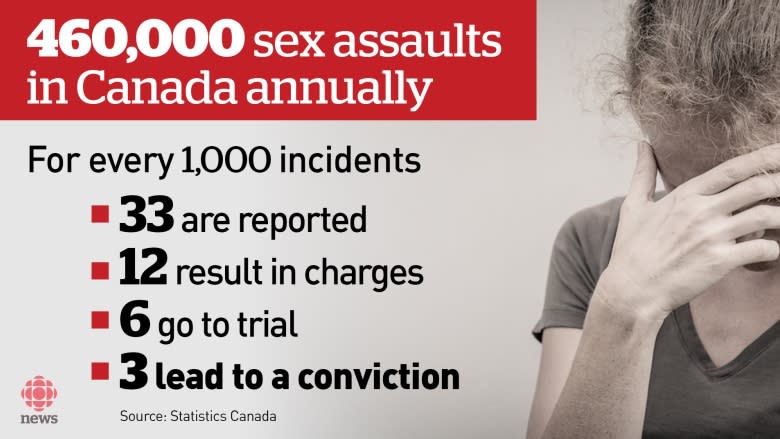Jian Ghomeshi trial could deter women from reporting sexual assault
Jennifer Leigh O'Neill describes herself as a sexual assault survivor and advocate for others like her.
After following coverage of the sexual assault and choking trial of Jian Ghomeshi, she decided to head down to the Toronto courthouse with about six other people to make a statement with protest placards.
Their concern is that the tough cross-examination by Ghomeshi's lawyer, Marie Henein, has led to public scrutiny of the three complainants and their actions before and after the alleged assaults.
"I came out because, basically, as a survivor of sexual assault who has gone through the court process and seen the accused found guilty, I feel it's important for us to show our faces during this court process," O'Neil said.
"I believe that women deserve better questioning when it comes to whether or not consent was obtained. I don't think we need to use these tactics. I think there's room for a full and fair defence, but I also think that there's room for respecting women's bodies."
Chilling effect noted
Other advocates who work with sexual assault survivors say the Ghomeshi trial has already cast a chill and discouraged some people from reporting sexual assaults to the police.
Lenore Lukasik-Foss heads the Ontario Coalition of Rape Crisis Centres and is director of the Sexual Assault Centre of Hamilton and Area. She has heard reactions to the trial from some of the people the centre helps.
"The things we're hearing so far are, 'Wow, I'm so glad I didn't report,' 'I don't know that I could ever report because of this. I don't want to be treated like this,'" Lukasik-Foss said
She blames the reactions on a combination of the widespread media coverage and the nature of the relationships between Ghomeshi and the complainants.
"Because the kinds of questioning that defence use when the perpetrator is known to the person have to be about your credibility, and it's personal details ... some survivors say it's re-traumatizing."
The statistics for sexual assault reporting are already dire.
In a 2012 study, University of Ottawa criminology professor Holly Johnson analyzed Statistics Canada data that suggests there are 460,000 sexual assaults annually in Canada, but only fraction, about 15,000, are reported to police. For every 1,000 incidents, 33 are reported, 12 result in charges, six go to trial and three result in convictions.
Reluctance to come forward
There are myriad reasons for the low reporting rate.
Erin Ellis, a lawyer who represents sexual assault plaintiffs in civil court, says the treatment of some complainants in criminal trials is partly to blame. She says the extensive media coverage of the high-profile Ghomeshi case has simply highlighted what victims already know can happen to them in a criminal courtroom.
"I do think some survivors at home watching this will look at their behaviour both before and after the assault and believe that they don't stand a chance and that they wouldn't want to go through a criminal trial. And they may not report it to the police," said Ellis.
She says that's why some clients who have been sexually assaulted by someone they know prefer to go the route of civil court. She says civil court gives survivors the power to decide how things go up until the trial date, making it the client's case instead of the Crown's case, as is the case in criminal court.
Ellis also says the burden of proof is lighter in civil court.
"We have to show that it's more probable than not. A criminal case has to show beyond a reasonable doubt. So it [civil court] is a better balance."
Of course, the overall effect of the Ghomeshi trial won't be known until it's over. The judge's decision could become a major factor in whether complainants in other cases come forward.




